Related Research Articles

Sardinia is the second-largest island in the Mediterranean Sea, after Sicily, and one of the 20 regions of Italy. It is located west of the Italian Peninsula, north of Tunisia and immediately south of the French island of Corsica.
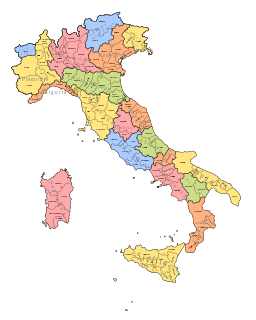
The provinces of Italy are the second-level administrative divisions of the Italian Republic, on an intermediate level between a municipality and a region. Since 2015, provinces have been classified as "institutional bodies of second level".

The Judicates, in English also referred to as Sardinian Kingdoms, Sardinian Judgedoms or Judicatures, were independent states that took power in Sardinia in the Middle Ages, between the ninth and fifteenth centuries. They were sovereign states with summa potestas, each with a ruler called judge, with the powers of a king.

The Sardinian Action Party is a Sardinian nationalist, regionalist and separatist political party in Sardinia. While being traditionally part of the Sardinian centre-left, the party has also sided with the centre-right coalition and, more recently, with Lega Nord/Lega.
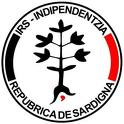
Independence Republic of Sardinia is a Sardist, left-wing nationalist and social-democratic and non-violent separatist political party in Sardinia. The party, whose long-time leader is Gavino Sale, supports the establishment of a "Republic of Sardinia" and its independence from Italy.
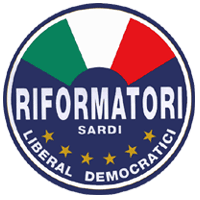
The Sardinian Reformers is a liberal-conservative, regionalist, Christian-democratic political party in Sardinia, led by Michele Cossa. The party, which has always been part of the centre-right at the Sardinian regional level, is a keen supporter of the free market, competition, globalization and a two-party system.
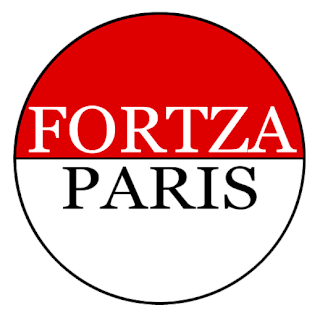
Fortza Paris is a regionalist political party in Sardinia.

Lega Sardegna, whose complete name is Lega Sardegna per Salvini Premier, is a regionalist and Sardinian nationalist political party active in Sardinia, Italy.

The Sardinians, or Sards, are a Romance language-speaking ethnic group native to Sardinia, from which the western Mediterranean island and autonomous region of Italy derives its name.

Sardinian nationalism or also Sardism is a social, cultural and political movement in Sardinia calling for the self-determination of the Sardinian people in a context of national devolution, further autonomy in Italy, or even outright independence from the latter. It also promotes the protection of the island's environment and the preservation of its cultural heritage.
Sardinia is Already Tomorrow, originally named Sardinia Domani, was a short-lived centrist political party in Sardinia, functioning primarily as a group of elects within the Regional Council of Sardinia.

Lucio Abis was an Italian politician from Oristano who was part of the Christian Democrats.

Francesca Barracciu is an Italian politician. She is a former Member of the European Parliament (MEP).
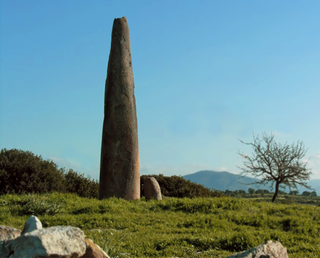
The Pre-Nuragic period refers to the prehistory of Sardinia from the Paleolithic until the middle Bronze Age, when the Nuragic civilization flourished on the island.
Unidos is a centre-right separatist political party in Sardinia.

The Byzantine age in Sardinian history conventionally begins with the island's reconquest by Justinian I in 534. This ended the Vandal dominion of the island after about 80 years. There was still a substantial continuity with the Roman phase at this time. The invasion of Italy by the Longobards in 568, which changed the face of Italy, only resulted in a few coastal raids on Sardinia.

The 2019 Sardinian regional election took place on 24 February 2019. The election was for all 59 elected seats of the Regional Council of Sardinia as well as the President of the Region who, along with the second placed presidential candidate, would also become members of the Regional Council.

The Sardinia national football team is the official football team of Sardinia. It is organised by the Sardinian National Sports Federation, founded in 2012. The team has been colloquially referred with the name Sa Natzionale.
The Base was a political party active in Sardinia, led by Efisio Arbau.
Sardinia 20Twenty is a political party active in Sardinia, led by Stefano Tunis.
References
- ↑ Mario Diana: impresa, sport e politica. Ecco la sua storia
- ↑ Notizie Elezioni Provinciali in Sardegna Aprile 2000
- ↑ Si spacca la maggioranza in Regione Fuori Lombardo, Diana, Campus e Mulas
- ↑ Fondi ai gruppi regionali in Sardegna, arrestati i deputati del Pdl Mario Diana e Carlo Sanjust
- ↑ Spese pazze Sardegna, condannato a 5 anni e mezzo l'ex Pdl Diana: "Usato come paravento dagli altri consiglieri"